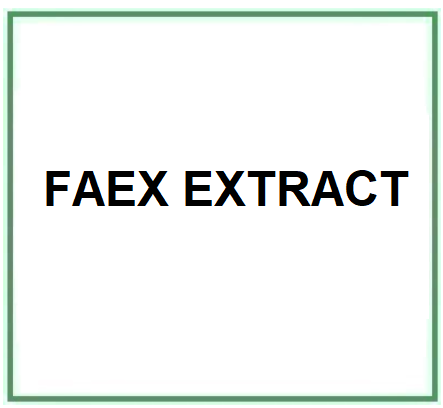Faex Extract is a natural ingredient, a complex mixture of yeast extract.
It appears as a yellowish or whitish powder with a characteristic odour, deliquescent, water-soluble with an acid reaction pH 6.6

What it is used for and where
Synthesis of high-protein intermediate materials consisting of bacterial growth factors and vitamins.
Food
It improves the taste of food products, softens dough and product, covers up intense flavour, too salty taste and adds a discrete aroma. Typically, fermentation for food products makes use of API, VC, Saccharomyces cerevisiae, amino acids and antibiotics, and makes use of modern biotechnology that biodegrades the nucleic acid and proteins in fresh yeast cells. The end product is free of fatty acids and cholesterol. Microbial culture medium: Bacillus subtilis, yeast and Mycoplasma, Gluconobacter, Acetobacter, Pseudomonas and others.
Dosages: 1.0-1.2% for baked bread, 0.3-0.5% for other products. Fermentation at 35 ~ 38°C.
Cosmetics
In Faex extract, there are peptides, amino acids, vitamins (often vitamin B1 thiamine and B vitamins) that have the function of moisturising and reactivating the skin.
Other uses
Biological compound for biochemical research
Industry
It is obtained, by enzymolysis, from the separation of fresh brewer's yeast emulsion. It contains trace elements, peptides, nucleotides, B vitamins and favourable environments for the growth of microorganisms.
Fermentation
Depending on its uses, Faex extract can be refined by the following fermentation processes:
- Refined product with high nitrogen concentration
- Refined product with low nitrogen concentration
- Refined product to pharmaceutical standards
The most relevant studies on this chemical compound have been selected with a summary of their contents:
Faex Extract studies
Typical commercial product characteristics Bulk Yeast Extract
| Appearance | Yellow or yellow brown powder |
| Boiling Point | 365.8±21.0°C at 760 mmHg |
| Flash Point | 175.0±22.1°C |
| Density | 1.4±0.1 g/cm3 |
Crude Protein
| ≥48.0% |
| Amino Acid | ≥45.0% |
Mannosan + β- glucan
| 35.0% |
| LogP | 4.59 |
| Refraction Index | 1.606 |
Vapour Pressure
| 0.0±0.9 mmHg at 25°C |
Loss on Drying
| ≤5.0% |
Sulphated Ash
| ≤3.0% |
| Pb | ≤3mg/kg |
| As | ≤1mg/kg |
| Hg | ≤0.1mg/kg |
| Cd | ≤1mg/kg |
Yeast & Mold
| ≤100cfu/g |
| Total microbacterial | ≤1000cfu/g |
Shelf Life
| 2 Years |
- Molecular Formula C19H14O2
- Molecular Weight 319.193
- Exact Mass 318.025543
- CAS 8013-01-2
- UNII
- EC Number 232-387-9
- DSSTox Substance ID DTXSID4051247
- IUPAC 2-(11H-benzo[a]fluoren-11-yl)acetic acid
- InChl=1S/C19H14O2/c20-18(21)11-17-15-8-4-3-7-14(15)16-10-9-12-5-1-2-6-13(12)19(16)17/h1-10,17H,11H2,(H,20,21)
- InChl Key GQNBDGXKDJSVGQ-UHFFFAOYSA-N
- SMILES C1=CC=C2C(=C1)C=CC3=C2C(C4=CC=CC=C34)CC(=O)O
- MDL number MFCD00132599
- PubChem Substance ID
- ChEBI 174614
- eCl@ss 42040000
- NACRES NA.85
- RTECS ZF6610000
Synonyms
- Benzeneacetic acid, α-(2-bromoethyl)-α-phenyl-
- 4-bromo-2,2-diphenylbutanoic acid
- microbial growth medium
- Select Yeast Extract
- 4-Bromo-2,2-diphenylbutyric acid
- 2-(11H-benzo[a]fluoren-11-yl)acetic acid
![]() Faex extract
Faex extract 




